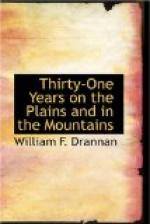No doubt if we could have understood their language they were then laying plans to capture the first emigrant train that might come that way. The moon was shining brightly, and we had a splendid chance to have stampeded their stock, but I did not think it best from the fact that it would put them on their guard, which would be to the detriment of the cavalry when they should arrive. We decided not to disturb them until the cavalry came up, knowing that the command would lose no time in getting there, and that it would be before daylight if it was possible.
We counted the horses of the Indians as best we could by moonlight, and made out eighty head of them. We could not make out just the number of Indians, but estimated them at seventy-five, After ascertaining as near as we could the lay of the ground and the general situation, we returned to our horses, and all started in the direction that we expected the command to come from. After we had ridden about a half mile I stopped, and George Jones started on with the other scouts to meet the command. After riding five miles they met Lieut. Jackson coming with two companies of cavalry and the entire scout force; and long before I expected them Black Bess told me by her actions that they were coming.
The Lieutenant formed his men in a triangle on the ridge, his object being to pocket the Indians; in other words, to bunch them up or prevent them from scattering. While he was forming his men and giving instructions, I told my men where the horses were and that we must get to them about the time the cavalry made the attack on the Indians. I told them that no doubt the horses would have ropes on them and the first one that I come to I would take him and lead the way. “And when you hear the first shot, all raise the yell, for by doing that we will be able to make the stampede, and if nothing goes wrong we will keep the stock going until we reach headquarters.” When I got to the horses about the first one I stumbled onto was a white one, with a long hair rope on; I caught him and led the way, and he made a good leader for the others to follow.
We got to the horses a few moments before the soldiers got to the Indian camp, and at the first shot we all raised the yell, and as I led the white pony away all followed, and we did not halt until we were five or six miles off. Here we came to a small stream that meandered through a little valley. There we stopped awhile to let our horses drink and rest, and while there we counted our horses and found that we had seventy-eight.
We reached camp about six o’clock the next morning, but the soldiers did not get in until noon. When the fight was over the Lieutenant put out a strong picket guard and remained there until morning in order to catch the Apaches that might be secreted in the sage-brush.
When daylight came he succeed in jumping up eleven, which he considered ample pay for staying there a few hours. In this fight sixty-six Indians were killed, besides we got all their horses, blankets, ropes and such other articles as they had.




